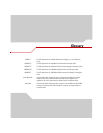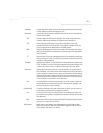
ES3000 User Guide
GL-4
Multicast A single packet sent to a specific group of end stations on a network.
Port monitoring The ability to monitor the traffic passing through a port on a device to analyze
network characteristics and perform troubleshooting.
Port speed The speed that a port on a device uses to communicate with another device or the
network.
Port trunking The ability to combine multiple ports on a device to create a single, high-bandwidth
connection.
Protocol A set of rules for communication between devices on a network.
Quality of Service A term to describe delay, throughput, bandwidth, and other factors that measure the
service quality provided to a user.
Segment A section of a LAN that is connected to the rest of the network using a switch, bridge,
or repeater.
SNMP Simple Network Management Protocol. An IETF standard protocol for managing
devices on a TCP/IP network.
Spanning Tree A technique that detects loops in a network and logically blocks the redundant paths,
ensuring that only one route exists between any two LANs.
Spanning Tree Protocol (STP) A protocol that finds the most efficient path between segments of a multi-looped,
bridged network. STP allows redundant switches and bridges to be used for network
resilience, without the broadcast storms associated with looping. If a switch or
bridge falls, a new path to a redundant switch or bridge is opened.
Switch A device that interconnects several LANs to form a single logical LAN that comprises
of several LAN segments. Switches are similar to bridges, in that they connect LANs
of a different type; however they connect more LANs than a bridge and are generally
more sophisticated.
TCP/IP Transmission Control Protocol/Internet Protocol. This is the name for two of the most
well known protocols developed for the interconnection of networks. Originally a
UNIX standard, TCP/IP is now supported on almost all platforms, and is the protocol
of the Internet.TCP relates to the content of the data traveling through a network -
ensuring that the information sent arrives in one piece when it reaches its
destination.IP relates to the address of the end station to which data is being sent,
as well as the address of the destination network.
Telnet A TCP/IP application protocol that provides a virtual terminal service, allowing a user
to log into another computer system and access a device as if the user were
connected directly to the device.
TFTP Trivial File Transfer Protocol. Allows the transfer of files (such as software upgrades)
from a remote device using the local management capabilities of the Switch.


















